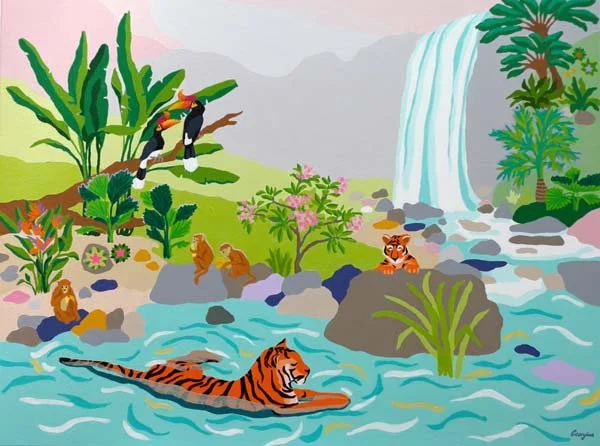Sebastián Espejo is a Chilean artist who views painting as a living organism and as a practice tied to attention, understanding it as a way of growing outward. His work focuses on the beauty and transience of the everyday. Espejo has exhibited in institutions in Chile, the UK, USA, and Taiwan (R.O.C.). @sebaespejov
Where were you born and raised? How did it influence your art and your thinking about the world? I was born in Viña del Mar, Chile. Its influence is so strong that I can hardly distinguish anything that escapes it. I’m still the child climbing the tree, looking at the Pacific Ocean through the leaves.
When did you first fall in love with art and realize you wanted to be an artist? For you, what is the importance of the arts? Art has always been a tool for building my own subjectivity; for me, and for others.
I never fell in love with it—it was always there, before me.
The importance of art lies in attention and the sharing of experiences.
What does your typical day in the studio look like? How do you usually begin, and what helps keep you connected to the work? I usually wake up before dawn—in England, that can be as early as 4:30 in the summer. I feed my dog, have some coffee, do a bit of cleaning, and wander around. After that morning routine, I'm ready to paint for about 1–2 hours. I divide my practice between boldly starting new paintings from direct observation, and slowly building up layers on already worked surfaces. I can be working on six to ten paintings at once. Some have been in my studio for years.
I mainly use oil, but I mix it with wax, varnish, and other unconventional materials. I mostly paint on wooden surfaces.
What are you currently working on, and what kinds of questions are guiding you in the studio right now?
I'm preparing a solo show for late June at Des Bains, centered around lichens—living organisms that accompany us, often unnoticed. I collect found fragments of bark or sticks covered in lichens and incorporate them into my usual still life settings.
I'm also preparing shows for Seoul and the US later this year. In both cases, I'm exploring poetic relationships between the insignificant and the cosmic.
What do you hope people feel when they experience your art? What are you trying to express? When a painting works, it should lift the spirit for a moment. It’s like taking a breath of air.
Which artists, living or historic, would you like to meet? Adolfo Couve, Pablo Burchard, Ximena Cristi.
Do you find yourself looking beyond painting—to literature, science, or other fields—for inspiration or insight? Everything ends up in the mix. I try to keep my curiosity alive, so if poetry or biology catches my attention, it's welcome
A great thing about living in London is…
London is the most exciting place to be as an artist. It carries a unique vibration—euphoric and gentle, ancient and new.
Has there ever been a project that asked more of you than expected—emotionally or creatively? How did you respond? As of today, all my projects are blossoms from a garden of joy.
You’ve studied with and been supported by several important figures. Who do you feel has helped shape your way of working or thinking about art? Alejandra Wolff, Voluspa Jarpa, and Sergio Estay are my three most important teachers.
Luis Pérez-Oramas and Gabriel Pérez Barreiro are voices and supporters I deeply admire.
In your practice, is there a connection between being close to the natural world and the way you approach painting? As a living organism, I believe painting is an extension of my limbs—a way of growing and a source of belonging. In that sense, I don’t feel there are any boundaries between nature and art.
With the rapid development of AI, artists are reflecting on the nature of creativity itself. How are you thinking about the difference between handmade work and technologically mediated creation?
The problem with AI is that it’s controlled by the biggest corporations in the world. Tools and technology are neither good nor bad. I think we live in a world where techniques have gone beyond science, and that’s scary.
Exploring ideas, art, and the creative process connects me to…breathing.




















































































